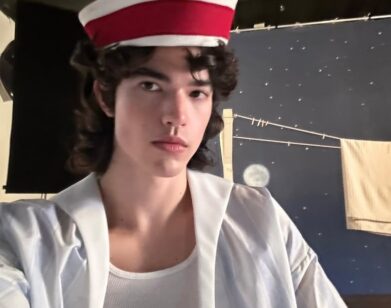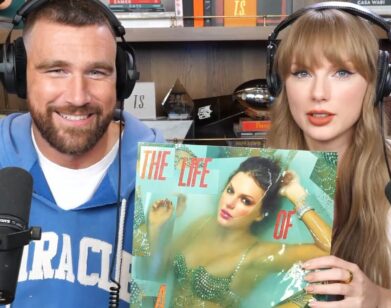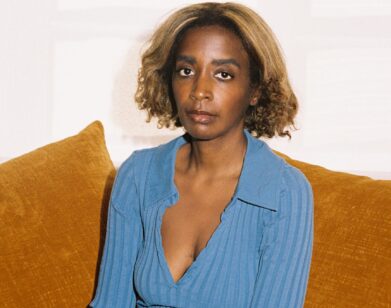Michael Cunningham Bears Witness

ABOVE: MICHAEL CUNNINGHAM. PHOTO BY THEA GOLDBERG
In Michael Cunningham’s latest novel, The Snow Queen (FSG), a character named Tyler Meeks is struggling not only to resuscitate his dream of being a musician but, more immediately, to write lyrics to a song for his dying fiancée, Beth, to sing at their wedding. Cunningham perfects a description of an artist begging thin air for divine inspiration; “there is, Tyler believes, a myth missing from the pantheon.” Ironically, I can think of no other living contemporary writer whose prose is so gorgeous and fluid that each sentence borders on melody. On the very first page of his 1990 debut A Home at the End of the World, Cunningham describes old plastic bags drying on a clothing line as “a string of thrifty tame jellyfish floating in the sun.” In the current novel, too, he spins pocket poems from everyday ether: here, the East Village sidewalk is described as “the color of elephant hide.” Cunningham is a master of color, light, and mood, and extraordinary sentences are all over The Snow Queen, which follows the plaintive hopes and losses of the two Meeks brothers, Tyler and Barrett, in New York in the first decade of the 21st century. As a younger author there is very much to appreciate and very little to steal from Cunningham—his novels seem to possess the kind of lyricism for which one either has the ear or not. God, you think, when reading the difficulties of poor Tyler in his apartment in Bushwick, just ask Michael Cunningham to write your love song.
The Snow Queen begins with a flash of light: “a pale aqua light, translucent, a swatch of veil, star-high, no, lower than the stars, but high, higher than a spaceship hovering above the treetops.” Barrett, having just been dumped by yet another boyfriend, sees this apparition (A sign from god? A tumor pressing on the optic nerve? A freak celestial occurrence?) one night while crossing Central Park. The light, like great fiction, doesn’t offer its own interpretation. It just is. But Cunningham plants this strange visitation at a time when the world is in some need of godlike assistance, both inside the Meeks brothers’ apartment (where Beth has cancer) and out (just before the 2004 election). I had lunch in mid-May with Cunningham to discuss his writing and the America we’ve found ourselves in.
CHRISTOPHER BOLLEN: Have you ever experienced the equivalent of an orb of light in the sky?
MICHAEL CUNNINGHAM: No, I haven’t. My mother was Catholic; my sister and I were not raised Catholic. I grew up visiting aunts who lived in houses with saints and incense. There was this little whiff of incense and crucifix, which found its way into our utterly secular suburban enclave. I remember when I was in high school, I made friends with a girl who went to the all-girls Catholic school. I went to see her school, and at the end of the hallway was a big white marble statue of Jesus. And then out beyond the playground was a field of black iron crosses. My reaction was, “Fuck my secular high school that looks a little bit like a strip mall that’s going out of business.”
BOLLEN: In terms of aesthetics, there’s nothing better than a Catholic school.
CUNNINGHAM: There is something about all of that ritual and devotion that brought me around to wondering, “What if a secular, regular guy with a job and a string of crappy boyfriends saw a visitation—what would that be like?” I just thought immediately what if he felt the irrefutable evidence of some consciousness beyond human that tells him nothing at all. And there are no instructions of any kind beyond the announcement of its presence. Nothing has said, “Go forth and find people where they’re sleeping and see if they’re safe.” Nothing like that.
BOLLEN: And thus begins the narrative of one of the two brothers of the book. The other, older brother Tyler is trying to look for a miracle of his own.
CUNNINGHAM: Yes, for him I was trying to write a more complicated way about people’s relationships to mind-altering substances. The predominant story of that is simplistic, and the message is, “You are foolish and cowardly and you have to stop this right now!” Not that everybody probably shouldn’t get off them, but everybody who’s on drugs is somehow insufficiently equipped for ordinary human life.
BOLLEN: How old do you think that drug morality tale is? Because it doesn’t seem like that’s built into every generation—at least for fiction. There were novels in the ’60s and ’70s that didn’t take such a dark view of drugs. Maybe it’s a Nancy Reagan, ’80s kind of crackdown.
CUNNINGHAM: I did acid in high school, and it was great.
BOLLEN: I was a late bloomer. I did acid my freshman year of college.
CUNNINGHAM: I blame the Reagans for almost everything, but it’s also true that after bad drugs entered the picture, it actually isn’t necessarily a good idea for anyone.
BOLLEN: Today, if you know anyone who’s on meth, there’s really not much there to romanticize or promote. It’s all so dark.
CUNNINGHAM: Yeah, I have a friend who’s gone that way. There is a well-known psychiatrist who specializes in addiction issues, and he won’t take crystal patients.
BOLLEN: Because he knows he can’t help them.
CUNNINGHAM: But the short answer is that I wanted to try to explore a more complicated relationship with drugs than just the stated formality. What if it were the opposite? What if you hope to get into a more intimate context?
BOLLEN: Tyler is trying to use drugs—first coke and then heroin—to be able to write music.
CUNNINGHAM: Yeah. He’s actually trying to break through with drugs.
BOLLEN: But there is a connection in that way with his younger brother, Barrett. They’re both stuck in these ruts, in that their lives didn’t quite work out as planned, and they both seem to be waiting around for a higher calling.
CUNNINGHAM: Well, we leave Tyler at the end in a slightly ambiguous mind.
BOLLEN: Yeah, I was surprised by that. I don’t want to give it away but I was surprised by where you left him.
CUNNINGHAM: Yeah, it felt right; I may look back on it five years from now… But I didn’t want to moralize, and at the same time I know from certain friends that eventually drugs will fail you. I didn’t want to be comfortable to leave this book as a sort of advertisement for mind-altering substances, because they have their uses and they have their limits.
BOLLEN: The character you’re talking about was undergoing immense amounts stress. In the first third of the book, his wife is dying of cancer. What I like most about The Snow Queen is that, on one had, there are these very dramatic events—a divine light in the sky, a young woman dying of cancer, even a mother who was stuck by lightning on a golf course—but you on the other hand you manage to temper all of that with the rhythms and grinds of mundane situations. Those aren’t easy dramatic episodes to balance out.
CUNNINGHAM: You work to make that balance. The book leads up to the event and it picks up after the event, but we actually skip over the big, climatic scene. Tyler and Beth are loosely based on people I know. I emphasis the word “loosely,” but they know. There’s been no secret about it.
BOLLEN: Is your Beth still alive?
CUNNINGHAM: She’s still very much with us. But a young woman with stage-four cancer is not a character I would’ve just decided to write if I didn’t have notes on it; if I hadn’t been able to talk at length to people who’ve had that experience. That felt like the only way besides the hideous version of Dickens at his worst sentimentality.
BOLLEN: There’s a moment where you mention doctors that really struck a chord with me because I remember from when my father was dying. They aren’t helpful. They say one thing and the next doctor says another and there’s all this misinformation and no one steps forward to show you what it is and what needs to be done. It’s all deflection.
CUNNINGHAM: That’s was like that with my mother, too. It’s always the case. You expect there to be a “team leader” to address the questions, and there’s not.
BOLLEN: Looking for the father figure is a very Catholic tendency, I guess. Do you think we’re just expecting too much from medicine?
CUNNINGHAM: No. Medicine is non-delivering. I do not take responsibility. It’s so specialized and balkanized.
BOLLEN: Back to your book, the story takes place between 2004 and 2008, specifically one presidential term of office. It is deep in the last decade in New York, and yet I think you managed, surprisingly, not to mention 9/11 once.
CUNNINGHAM: I feel we are so deeply affected by Vietnam and the AIDS epidemic, and 9/11, and the decision to bomb the fuck out of Iraq, that you can write about it without needing to actually directly refer about it. There’s no obligation to say, “By the way, 9/11 started.”
BOLLEN: There’s a telling shift in that particular four-year period. It starts and ends just before an election. In 2004, Tyler is convinced America will be smart enough to vote for Kerry. In 2008, he’s certain they will be dumb enough to choose McCain.
CUNNINGHAM: Tyler is the only even remotely politically intact character, and he’s always wrong.
BOLLEN: And yet his life is a mess. He has the prescription for American society, but not necessarily for himself.
CUNNINGHAM: There’s also the fact that American fiction is basically the most apolitical fiction on the globe. A South American writer wouldn’t dare think of writing a novel if it didn’t allude to the system into which these people are orchestrated—or an Eastern European writer, or a Russian writer, or a Chinese writer. Only American writers are able to imagine that the government and the corporations—all of it—seem to have no effect whatsoever.
BOLLEN: Why do you think this is? Is this a holdover from that idea of untouchable American triumph in the ’50s? Or do writers worry that it dates their prose? Or maybe they really don’t think a reader needs a lecture in the midst of their entertainment.
CUNNINGHAM: I think it’s partly that. But we both know that when you get too hysterical at a dinner party and start talking politics—
BOLLEN: After a while you become the pedantic person that won’t stop shoving it in everyone’s face.
CUNNINGHAM: Maybe writers were terrified to ever be over-earnest.
BOLLEN: It really brings down the party.
CUNNINGHAM: It can really bring the party down. But it also raises the question: why would you want to be at a party that is being brought down by 10 minutes of earnest conversation of life and death? Is it really important to keep that party going? You’d rather be popular than free.
BOLLEN: Sure, because we all want to be invited back to the party.
CUNNINGHAM: I also think that Americans have effectively given in to the idea that this shit really doesn’t matter that much. I know intelligent people who say it doesn’t matter.
BOLLEN: I sometimes wonder if this is because the truly realist novel has gone out of favor in high literature. We are all taught and constantly told to appreciate the formal or innovative aspects of literature. Everything else is inferior.
CUNNINGHAM: Well, there is that. And the idea of, why put George W. Bush in your novel if, in 500 years, no one will know who he is? But I don’t agree with that. I feel like the less publicized job of novels is being witness, being part of the historical record.
BOLLEN: The Snow Queen is set in the recent present. You’re, of course, also known for your historical novels—like The Hours or Specimen Days, which must have been such a different writing approach simply because of all the research required. For historical novels, I imagine you can get weighted down by each detail.
CUNNINGHAM: I do do that—whether or not electricity was invented in 1888. For The Hours I did tons of research. And I didn’t have any money, really. At one point, I went to the village of Rodmell, where Woolf committed suicide. I walked from the house to the river, and suddenly all the grass gets flat. It’s like Texas.
BOLLEN: And you were probably imagining it like lush, old-English pasture.
CUNNINGHAM: I was thinking, when’s the river coming? We drove to the embankment, and there’s essentially a river-shaped mud puddle. It would have been more of a river when it was raining. But I hadn’t realized until I actually saw the river in person what work it must have been to drown herself there. It wasn’t just a matter of Virginia Woolf walking into the river. So it changed my entire sense of the event.
BOLLEN: Wow. She really had to fight to die. It wasn’t an easy suicide. See, that’s the perfect example of needing to do the research. For The Snow Queen, by comparison, you had to get to know a far closer environment—Bushwick. Did you actually know the apartment you give the characters?
CUNNINGHAM: The apartment is invented, but I walked around Bushwick and I did find the exact building I had described. So many of these decisions are intuitive. I wanted them to live in a sort of urban nowhere. I wanted them to live in a place that made almost more demands for their survival. Bushwick about 10 years ago was very much like that.
BOLLEN: It really solders them together as a family unit when they’re surrounding by the threats or sprawl outside their windows.
CUNNINGHAM: Exactly. They could be pioneers in Nebraska.
BOLLEN: So much of the book deals with the relationship of two brothers. Do you have a brother? I don’t. The idea of the brother is so fascinating and foreign to me.
CUNNINGHAM: You know what I did have? A best friend. At a really young age, I have a best friend, and it’s really the first person you feel love for. I don’t mean a romantic or sexual love. But he was the first person I loved ardently outside my family. And I think that kind of love is underestimated in terms of life-long experiences. That first experience of actually caring about another person probably wasn’t the first person you kissed. It was probably the boy who stayed over at your house three nights a week. I feel like that bond is so underrepresented. If it’s represented, it must be in young adult books.
BOLLEN: But in young adult books, they’d eventually become rivals for the “real love.” Their love must be forfeited for romantic love. I guess you could say that kind of friendship and love happens with Huck Finn and Tom Sawyer. That’s the only one I can name.
CUNNINGHAM: Right, that’s one. But there aren’t so many.
BOLLEN: The Snow Queen is divided into three parts. The structure of three is prevalent in many of your books—three sections, three narrators, three main characters, three time periods, relationships of three.
CUNNINGHAM: Three just keep turning up—in all of eternity, in the wise men, in three acts of a play.
BOLLEN: And a triangle is the most stable shape.
CUNNINGHAM: And the most variable. One point is wherever you want. Two is a straight line. But with a third, the possibilities are endless. Three is the first most interesting number we get to.
BOLLEN: Does three also feel most complete and most solid to you? You’ve told all sides with three.
CUNNINGHAM: This may be a bit of stretch… Obviously, I’m interested in how various sexualities cannot really be accurately defined as straight or gay, or even bisexual. There’s something about three, not being gay, bi, or straight. My first trio was in A Home at the End of the World.
BOLLEN: I know you’ve said in the past that you don’t want to be defined by—or limited to—being a “gay writer.” Obviously no one wants to be limited to a niche shelf in the bookstore. But I’m curious how your writing gay characters has changed over the decades and years. Barrett in The Snow Queen, for example, is a man who’s gay, but that’s treated more as one detail among others.
CUNNINGHAM: First, you could say I don’t want for me be seen primarily as a gay writer. I’ve never hidden my sexuality. It matters that I’m gay, it matters that I’m white, it matters that I’m male, it matters that I’m American. But basically it’s just less and less of a big deal.
BOLLEN: Being gay has become more normalized in culture, so writing about being gay, of course, changes. I still tend to think it does matter, that it isn’t incidental. Not yet.
CUNNINGHAM: I started writing right at the beginning of the AIDS epidemic. And it was impossible not to include that in my books. I entered the historical picture at a very interesting time. And I benefited from those who came before me, like Edmund White. At that time I was writing, I couldn’t imagine writing a novel that didn’t touch on the AIDS epidemic. But that has changed. At this point, I can approach the subject differently. That wasn’t always the case.
BOLLEN: One of my favorite scenes in The Snow Queen is when Barrett is working in the vintage clothing shop and helping a young woman pick out a necklace. This simple consumer moment is very touching in its intimacy. I think this strange, mundane experience of clothes shopping by oneself hasn’t been explored enough in literature. But it’s really one of those “who are you?” opportunities of self-examination.
CUNNINGHAM: You know, how we dress is, as far as I can tell, the only inescapably public choice that we have. People don’t need to know what you eat, people don’t need to know who you have sex with. But there’s no escaping what you wear and the fact that you’ve chosen it. Even if you insist that you don’t care about fashion, that’s your statement. It’s really one realm of life where you are forced to make your own statement.
BOLLEN: And sadly New York isn’t quite what it used to be in terms of street fashion. It’s gotten pretty boring. I think the fall was due to the rise of the Gap. Because even if you go to thrift stores now, it’s all ’90s Gap clothes.
CUNNINGHAM: There was that great article in Vanity Fair a year or two ago that had the startling conclusion that design has been frozen for the last 20 years. Cars still look the same. What we’re wearing, we could have worn 10 years ago, as opposed to if we had met for lunch first in 1972 and then again in 1982… I blame Banana Republic. Or Crate and Barrel and Pottery Barn. But I will say one thing I love about New York is that most days I see somebody wearing an outfit that’s all their own and they look great. It’s rare. But most in most European cities that’s hard to find. There isn’t the same eccentricity.
BOLLEN: When did you move to New York?
CUNNINGHAM: Twenty-five years ago. Originally I went from Iowa to Provincetown, for a residency. I also worked in a bar, which was great because I could write in the mornings and mix drinks at night. And then the day came when I realized I couldn’t do it anymore. It’s weird being sober and watching, five nights a week, what happens when someone is under the influence of alcohol.
BOLLEN: They get stupider and stupider as the night progresses, and probably meaner to the bartender.
CUNNINGHAM: And less interesting. So I came to New York thinking, I’m not a young thing anymore. Where can you go and get some kind of adult job with no résumé? I came here to not be a bartender. I thought, it’s got to be time to stop slinging cocktails. I knew it would have to happen. It felt like it was time to get a job that made sense it of itself. I actually got a job at the Carnegie Foundation.
BOLEEN: Did you feel at this point that you were going to make it as a novelist?
CUNNINGHAM: I thought for years that I was going to be one of the ones who gets to have that life. And then one night it came to me that everybody thinks that. Everyone assumes they are going to have lives that matter just the same way. But maybe it will never happen.
BOLLEN: Is that a terrifying or life-saving realization?
CUNNINGHAM: It my case, it was more the latter. Here’s the funny thing. I thought I had figured it out. And there are certainly other things to do in the world although it was getting a little late for me to go another route. I thought about it and decided, you know what? I want to keep writing. And that’s where it took off. I think before, without realizing it, I had gradually evolved into writing something that looked like the stories I kept reading in The New Yorker. Then I gave up and I started writing A Home at the End of the World and started dating Kenny. After a couple of dates I thought, I guess I should show him what I write. I don’t know what he’ll do if he thinks it’s crap. I don’t know.
BOLLEN: I can’t believe you showed him!
CUNNINGHAM: Well, how could you not?
BOLLEN: Because if he hated it, that would either be the end of the novel or the end of the relationship.
CUNNINGHAM: It felt serious enough that I thought I could. So I showed him the first few chapters, and he said it’s pretty good, why don’t you send a couple to The New Yorker. And I said, that’s so sweet, but no! The New Yorker at this point had an editor who sent my stories back, and wrote, “No, we admired it very much but I’m terribly sorry.” Here’s where perseverance and luck enter the picture. I sent them a story, a section of A Home at the End of the World, because I knew they weren’t going to buy it. It had a nine-year-old on drugs, sex in a cemetery, violence. But The New Yorker had changed editors at this time and there was a lot of tension in the air as to what the new New Yorker would be like. And they took the story.
BOLLEN: That must have been affirming.
CUNNINGHAM: Yeah, it was slightly unbelievable. By that point I was really happy with the narrative of the story, but I’d gotten beyond exultation. I couldn’t get exultated. I’d been around too long. If it had happened when I was 23 I would’ve been out of my mind. I was pleased, but not ecstatic.
BOLLEN: It’s so weird that as you get older, the ecstatic state doesn’t last as long. Something amazing happens and you get excited, and two hours later you’re cleaning out your refrigerator and trying to pay your rent.
CUNNINGHAM: I think it’s a good thing, because it’s a true thing. You learn that there are things that don’t make the kind of difference you think they will. My main satisfaction is in writing books. Certain days when I feel it’s coming together, when you found something you’re looking for, where you write a character, and discover, “Oh god, that’s what’s going on, that’s what these people are really doing,” that’s the satisfaction.
MICHAEL CUNNINGHAM’S THE SNOW QUEEN IS OUT NOW.
CHRISTOPHER BOLLEN IS THE EDITOR AT LARGE OF INTERVIEW MAGAZINE. HE IS ALSO A FICTION WRITER. HIS SECOND NOVEL, ORIENT, WILL BE RELEASED BY HARPERCOLLINS IN 2015.






